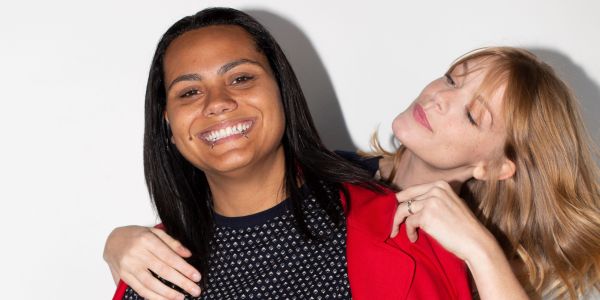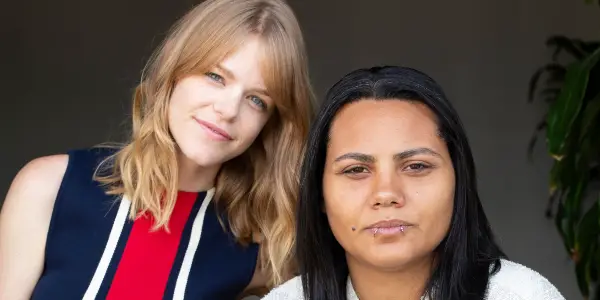Talking With Gabriela Ledesma & Callie Schuttera About The Making Of Their Film BLUE
Jacqui Blue has a lifetime background in theater and writing.…
After watching their debut feature film, I had the chance to speak with the two women behind Blue. Gabriela Ledesma and Callie Schuttera co-wrote Blue. The film is Ledesma‘s directorial debut. Schuttera took on the lead role as Helen Daniels, a young woman who tries putting the pieces of her life back together after a botched suicide attempt. The two women own and operate Poison Pictures, their production company and recently wrapped their second feature film, The Last Conception.
Jacqui Blue for Film Inquiry: What’s the story behind Blue?
Gabriela Ledesma: Blue is based on the events of my suicide attempt and experiences with self-harm. I’ve dealt with dark thoughts and depression for most of my life and I’ve explored countless remedies for my mental health including prescribed medication, self-medication, therapy (group and private) and just “taking it one day at a time”. Blue is not about my personal story as much as it’s about what I’ve learned from experimenting with recovery.
What makes Blue special to you?
Callie Schuttera: I love that Blue was the first thing I ever made with my wife. We learned so much about ourselves, each other and filmmaking throughout the process, and that has informed all the steps we’ve taken since then. I’m also so grateful that our first film addresses social issues. I had worried it was impossible to make a tangible positive difference in the world by performing or writing. And I now I feel that anxiety is, at least temporarily, put to rest. I’m confident that Blue is good thing and will offer something positive to someone who needs it.

Did you feel it was therapeutic for you to tell this deeply personal story?
Gabriela Ledesma: I guess you could call it therapeutic. I would say eye opening. It made me realize that I wasn’t crazy; I wasn’t alone in my pain. When I was doing research for the movie I looked into a lot of statistics and survival stories of people from around the world. I wanted to be sure I wasn’t just telling my story but a universal one. And once we made it to set, personal scars and experiences from my cast and crew kept coming to light. It took away this feeling of isolation and instead made me feel like I was leading a mental health crusade, with a large crowd behind me.
Since the story is based on true events, how much of the story did you add when writing the script and what elements did you add into the story?
Callie Schuttera: We wanted to keep the essence of Gabby’s experience alive, without specifically telling her story. So a lot of general plot elements came from Gabby’s life history and then we would create new characters and new dialogue within those same circumstances- that’s really where my script contributions came into play. I find creating an over-arching narrative to be extremely over-whelming. There are too many places a story can go! But I love constructing a voice and vocabulary for characters and developing the story through conversation- that part comes much more naturally to me.
How much of the original story stayed true to the final shooting script?
Gabriela Ledesma: I’d say fifty-fifty. I never wanted to make an auto-biography so from the beginning I thought of Helen as someone different than me. I never lived with my grandmother. I never worked at an insurance company. In fact my suicide attempt didn’t even take place in the United States. But there are a lot of details that are unmistakable: I tried to kill myself with rat poison, I distinctly recall male nurses discussing my prognosis during my coma, and there was also a kind female ER nurse who worked in the hospital and helped me during that rough transition period.
How did you relate to or connect with your character, Helen Daniels?
Callie Schuttera: In some ways, I didn’t relate. I’ve definitely struggled with my own mental health, but Helen experienced chronic depression since she was very young. My childhood was pretty idyllic. In fact it wasn’t until my late teens and early twenties that I experienced any real loss, anxiety or inner turmoil. So I did a lot of preparation trying to connect with Helen’s backstory and I studied the cases of young children with suicidal thoughts and how those thoughts affect the adults they become.
Did you find it hard to connect emotionally to the character and what she was going through? How did transforming into Helen affect you psychologically, if at all?
Callie Schuttera: I did worry I wouldn’t have time to fully connect with Helen, especially considering there were some scenes where we only had time for one or two takes. But I think being married to Gabby ultimately gave me a huge advantage. We spent a lot of time unpacking her struggles with suicide and depression, especially at the beginning of our relationship and Helen felt like a great way to take all that information and create something meaningful with it. I think that also made it easier to step away when the time came to leave Helen behind.
How involved were you with the actual production?
Gabriela Ledesma: Because of an extremely small budget, I wore quite a few hats. I wrote the script; Callie was my co-writer. Producing I think comes with being a hands on director so even though it involves a ton of work, I was happy to be part of all the gritty details. Callie and I hired every single cast and crew member, we secured every location, went over every penny spent and each word spoken on screen. I would say I enjoyed editing the least. I love being a part of that process but there are definitely superior editors out there and I want to work with them.
Callie Schuttera: It’s hard to hand the production reigns over to someone else once you start And we filmed a lot of Blue in and around my hometown which gave me a lot of responsibility by default. I was the only person above-the-line with relationships to local business, knowledge of the region etc. so I handled a lot of location negotiations, local crew hires, background coordination, and housing for LA cast and crew. I probably never would have sought out those tasks if they haven’t landed in my lap but I’m so glad they did- The experience was invaluable.
Tell me about your decision to keep the relationship between Helen and Rob platonic:
Gabriela Ledesma: For me it was about telling the audience that you can love and rely on someone that’s not your significant other (reversely you can also be there emotionally for someone who is not your significant other). It’s important to let yourself get close to other human beings without sex being automatically implied. You can find some beautiful friendships when you alleviate that pressure.
What was your experience like in the film festival circuit with Blue?
Gabriela Ledesma: A life lesson. It honestly reminded me that I’m speaking to a real human audience when I make movies. Watching people react to Blue in real time, and listening to them talk about their struggles and about their loved ones who took their own lives was humbling. The conversations ignited about this tough subject is what makes Blue so unique, and those are the moments I’m most proud of.
Callie Schuttera: It was truly a blast. Blue really seemed to resonate with live audiences. It was also the first time we got to gauge how the movie connects with people who are in the midst of their mental health struggles; that was powerful to see.

After Blue you went on to direct The Last Conception, how did that come about?
Gabriela Ledesma: Gabriel Constans is a novelist who reached out to Poison Pictures about one of his books that he’d adapted into a screen play. It’s a completely different vibe from Blue. The Last Conception is a comedy that features an Indian-American family that wants their daughter (who is in a lesbian relationship) to continue their supposed “royal blood line”. We got the chance to cast Marshall Manesh who I’ve been wanting to work with since he auditioned for Blue (his schedule conflicted with shooting days at the time). Nazanin Mandi and Matt Richards were also part of the cast and an absolute blast to work with.
What was the contrast like in your characters in Blue and The Last Conception?
Callie Schuttera: Night and day! Helen is generally mellow, easy going and she suffers a great deal internally. Charley is high-strung, cheery, and does nothing internally. They even have different hair colors!
What’s next on your acting slate?
Callie Schuttera: I’m really excited to get started on a horror/comedy feature we have in development. It’s a great take on zombies and I want to play with special effects makeup!
What’s next for Poison Pictures?
Gabriela Ledesma: We have The Last Conception and Jonny Loquasto’s Comedy Special currently being packaged for distribution and we have an array of movies in development from comedy, to documentary, to blood-and-guts horror.
Film Inquiry thanks Gabriela Ledesma and Callie Schuttera for taking the time to speak with us.
Does content like this matter to you?
Become a Member and support film journalism. Unlock access to all of Film Inquiry`s great articles. Join a community of like-minded readers who are passionate about cinema - get access to our private members Network, give back to independent filmmakers, and more.
Jacqui Blue has a lifetime background in theater and writing. After achieving international acclaim with her first film Beautiful Births, she was one of 10 Directors selected by James Franco for his Master Class, "Sex Scenes". She went on to work with Jared Padalecki & T.O.N.E-z in her suicide awareness documentary, I Chose Life: Stories of Suicide & Survival and appears on-screen next to Lou Diamond Phillips in The Last Train. www.jacquiblue.net













